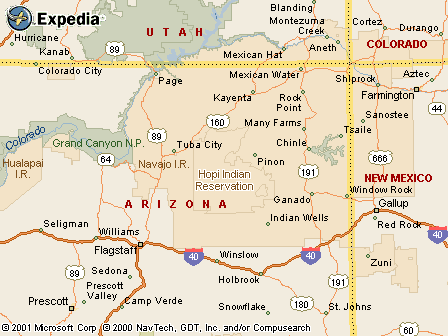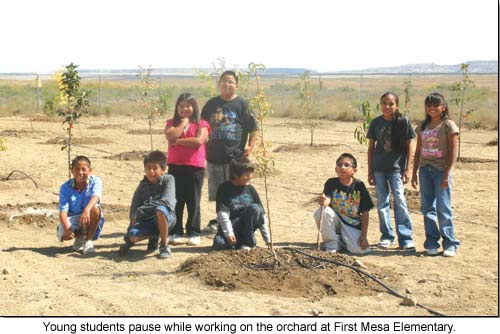 |
Canku Ota
|
 |
|
(Many Paths)
|
||
|
An Online Newsletter
Celebrating Native America
|
||
|
December 1, 2008 - Volume
6 Number 3
|
||
|
|
||
|
Orchard serves as
health, educational tool for Hopi
|
||
|
by Rosanda Suetopka
Thayer, The Navajo Hopi Observer
|
||
|
credits: {credits}
|
|
FruitaBŁ, Fruit Tree Planting Foundation, Hopi Tutskwa PermaCulture partner to create Hopi arborists
The First Mesa Elementary orchard has 40 trees set out in the back school area that students will attend to throughout the year. Students will be learning about fall plant dormancy, winter shedding and spring crop appearance and finally, harvesting and enjoying their work in being able to eat organically grown apples, pears, peaches, nectarines, cherries, pomegranates, persimmons and jujubes. The Fruit Tree Planting Foundation, under the direction of Cem Akin, has long been interested in working with Hopis and other tribes in getting these orchards going in Native communities where healthy food consumption could be most beneficial. The trees utilized for the local Hopi orchards are carefully selected to be most adaptable and have the highest survival rate as well as drought considerations and will supported by a water conservation-drip irrigation system that is connected to timers, so that the students can be assured of a full crop each year. To further ensure the trees' growth success, the trees are mature trees; each one about five feet in height and a few years old. A few even had fruit already on them when the community volunteers showed up for planting day at each school and in Kykotsmovi. The harvest from each garden will be used for lunches for students and community projects. A large portion of the educational outreach of this partnership, is showing the students how botany, environmental and earth science can actually affect their daily lives and can benefit their food consumption habits. Visiting First Mesa Elementary, several of the students who will be caring and nurturing their own special orchard, had comments. Laurel Hamilton, a Shungopavy student said, "I think our orchard is pretty awesome, its so cool that we can grow our own snacks." Lyle Daniels, a Sichomovi student commented, "Our teacher told us, that we must water it, take good care of it, work with our janitors and the parent volunteers to make sure we get a nice crop next year." Faylene Nevayaktewa, a Tewa student said, " It will be fruit for everyone for years to come. I will pick the first pomegranate." Finally, She'Che Grant, a Navajo student, said that he thought it was pretty neat that so many parents and community members came to help plant the orchard because it showed that many people really cared about being healthy and that they were interested in their school projects. "The orchard is just so cool," he said. Each school was required to submit a proposal for grant funding to receive the trees. A total of 62 fruit trees went to Moencopi Day School. The three community orchards planted at Kykotsmovi are located behind the Hopi tribal administrative buildings on Don Humetewa's farm property and are to used for all community members. For more information, contact Jacobo Marcus or Lillian Hill at the Hopi Tutskwa Permaculture organization at (928) 637-5468. |
 Hopi Indian Reservation map |
www.expedia.com |
|
|
||
|
|
||
| Canku Ota is a free Newsletter celebrating Native America, its traditions and accomplishments . We do not provide subscriber or visitor names to anyone. Some articles presented in Canku Ota may contain copyright material. We have received appropriate permissions for republishing any articles. Material appearing here is distributed without profit or monetary gain to those who have expressed an interest. This is in accordance with Title 17 U.S.C. Section 107. | ||
|
Canku Ota is a copyright ©
2000, 2001, 2002, 2003, 2004, 2005, 2006, 2007, 2008 of Vicki Barry
and Paul Barry.
|
||
 |
 |
|
|
The "Canku
Ota - A Newsletter Celebrating Native America" web site and
its design is the
|
||
|
Copyright ©
1999, 2000, 2001, 2002, 2003, 2004, 2005,
2006, 2007, 2008 of Paul C.
Barry.
|
||
|
All Rights Reserved.
|
||
 HOPI
RESERVATION, Ariz. - Building on the historical agrarian lifestyle
of the Hopi people, coupled with a desire to support and nurture
a healthy lifestyle that teaches responsibility and respect for
plant life, FruitaBŁ, Fruit Tree Planting Foundation and Hopi Tutskwa
PermaCulture planted a total of 320 trees and set up drip irrigation
system style orchards at First Mesa Elementary School and Moencopi
Day School. Three other community orchards were planted in the village
of Kykotsmovi.
HOPI
RESERVATION, Ariz. - Building on the historical agrarian lifestyle
of the Hopi people, coupled with a desire to support and nurture
a healthy lifestyle that teaches responsibility and respect for
plant life, FruitaBŁ, Fruit Tree Planting Foundation and Hopi Tutskwa
PermaCulture planted a total of 320 trees and set up drip irrigation
system style orchards at First Mesa Elementary School and Moencopi
Day School. Three other community orchards were planted in the village
of Kykotsmovi.